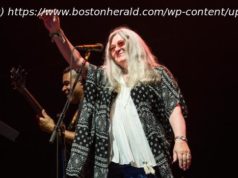They could amount to „fighting words.“
There is no question that Americans have the right to express racist, offensive, unpopular views under the First Amendment — it’s a right that has been repeatedly upheld by the US Supreme Court. But the right-wing demonstrators in Charlottesville, Virginia, last weekend may have gone too far when they began chanting racial and homophobic slurs to specific people.
It’s a gray area of constitutional law, but several experts said this week that the white supremacists may have crossed a line into what is known as unprotected speech.
In 1942, the Supreme Court ruled that „fighting words“ are not protected under the First Amendment. The Court defines fighting words as „those which by their very utterance inflict injury or tend to incite an immediate breach of the peace.“
Considering that Saturday’s rally turned violent, and led to one counterprotester’s death, it’s important to analyze the role that language may have played in sparking the violence and whether it was protected by the First Amendment.
While the generic anti-Semitic and anti-immigrant rants didn’t rise to fighting words, free speech experts believe right-wing demonstrators may have gone too far when they called specific people „ni**ers“ or „faggots.“ These could be interpreted as fighting words because they are slurs directed at certain individuals that would lead a reasonable person to retaliate.
However, some experts think it would be hard to prove whom the slurs were aimed at, since the demonstrators’ chants were part of a political rally.
„The most extreme of last weekend’s outrageous utterances in Charlottesville would be easy to deem unprotected, “ said Robert O’Neill, a well-known First Amendment scholar and former director of the Thomas Jefferson Center for the Protection of Free Expression at the University of Virginia (the campus where demonstrators rallied Friday night) .
On Saturday morning, media outlets reported a few repeated chants heard during the Unite the Right rally, including, „One people, one nation, end immigration, “ „Jews will not replace us, “ „White lives matter, “ and „Blood and soil.“
These white supremacist slogans clearly offended many counterprotesters, but the courts have generally interpreted such broad insults as protected forms of speech.
As the rally grew more heated, though, demonstrators directly disparaged specific people and groups of people. Huffington Post reporter Christopher Mathias tweeted a video of demonstrators yelling, „Fuck you, faggots, “ at counterprotesters:
A few hours later, Washington Post reporter Joe Heim said he heard demonstrators chanting, „Go the fuck back to Africa, “ and the n-word at a black woman across the street.
Constitutional law experts say these last two examples may not be protected forms of speech.
„You could make the case that it was an insulting epithet, obviously a slur and racist comment that would provoke someone to retaliate, “ said Caroline Mala Corbin, a constitutional law professor at the University of Miami.
When „fighting words“ became exempt from protection under the Chaplinsky v. New Hampshire ruling, it was based on the idea that such language did nothing to further public discourse, and instead inflicted harm on people. Based on that, Mala Corbin says use of „faggot“ and the n-word at Saturday’s demonstration would clearly fit this category of unprotected speech.
But over the years, Supreme Court justices have shown an aversion to the „fighting words“ doctrine, out of concern that it might be used to suppress protected political speech. So they’ve drastically narrowed their interpretation of fighting words to insults directed on the personal level. In their decisions, the Court has also ruled that police officers should have a higher level of restraint when a citizen insults them personally.
In general, for someone to prove that language is not protected under the „fighting words“ doctrine of the First Amendment, they have to show three things: first, that the language is, in fact, an insulting epithet. Second, that it’s uttered face to face to an individual. Third, that it’s likely to provoke someone to retaliate.
In the context of the Charlottesville demonstration, experts agree that slurs such as the n-word and „faggot“ would be considered serious personal insults and that they were directed at a specific person or group of people. What is unclear is whether their words were likely to spark immediate violence.
Considering that the African-American woman was across the street from demonstrators, and that counterprotesters were separated by barricades, lawyers could argue that it’s unlikely their words would trigger immediate violence.
David Hudson, a First Amendment expert and law professor at Vanderbilt University, said the context of a political rally adds another layers of complexity. Demonstrators might say that their slurs weren’t directed at anyone in particular.
„Most fighting-words cases involve one-on-one, face-to-face insults, “ Hudson wrote in an email.
While the Supreme Court tends to side with free speech arguments in such cases, lower courts have upheld many rulings that certain language is unprotected under the First Amendment. And some of those rulings involved similar racist slurs.
Here are some examples Hudson points to when state courts have found certain language not protected under the fighting words doctrine:
In 1999, a Minnesota appeals court found that calling a police officer a white, racist “motherfucker“ and wishing his mother would die was not considered free speech.
In 2001, a Minnesota appeals court upheld a ruling (State v. Hubbard) that a man who repeatedly flashed lewd hand signals to a young female driver was not exhibiting protected speech. That same year, an appeals court in Arizona found that it was not free speech when a man called a black woman the n-word and threw an empty can of Mountain Dew at her on the street.
In 2003, a Wisconsin appeals court ruled that calling a nude woman on the beach a “whore, ” “harlot, ” and “Jezebel” was not protected.
Start
United States
USA — Music Some racist, homophobic chants in Charlottesville may not be protected under 1st...






